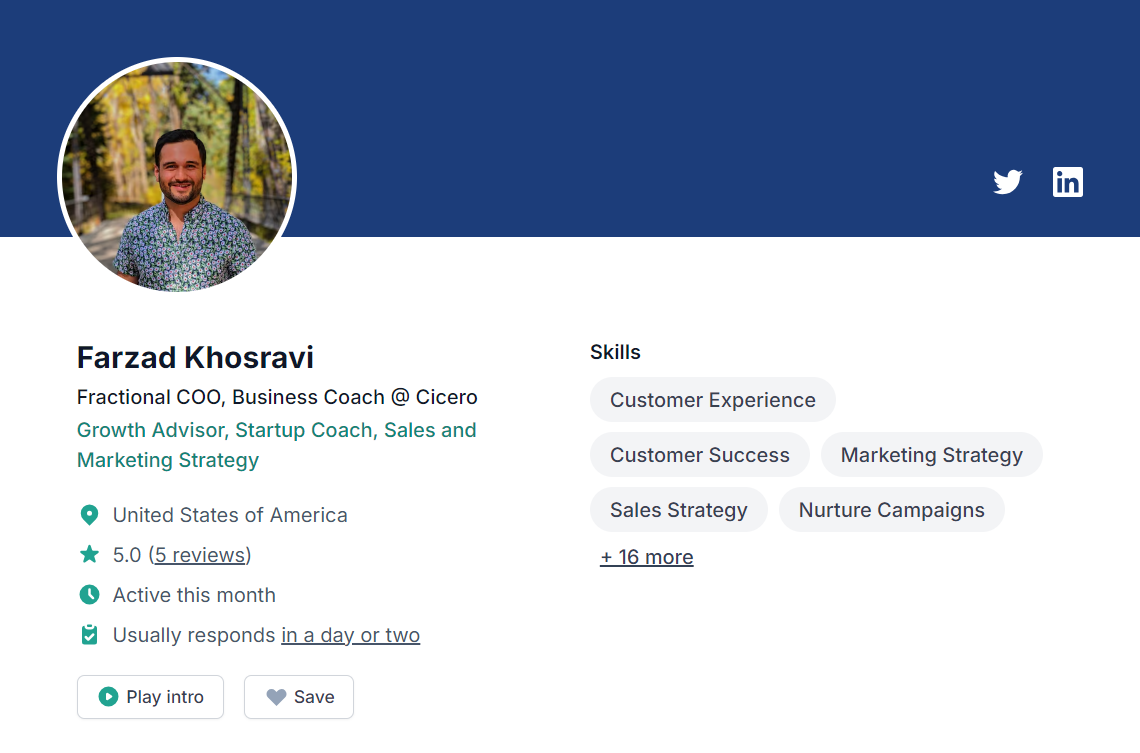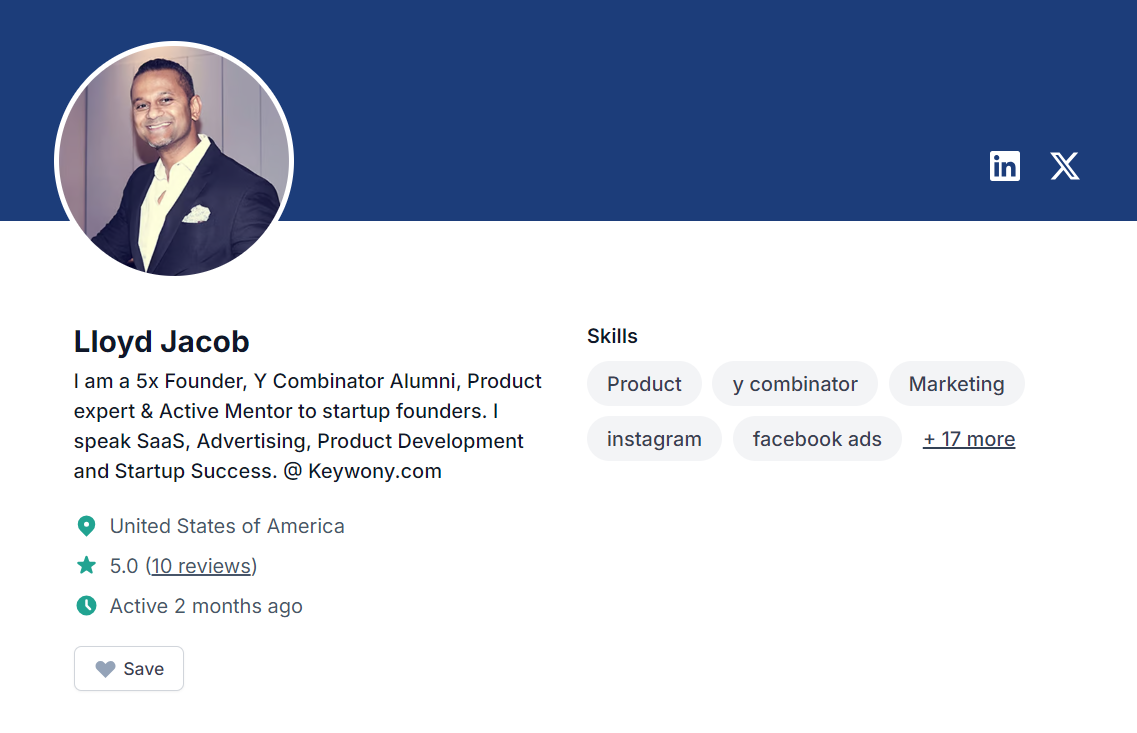But what does a business strategy coach really do, and how can they help your business thrive?
In this MentorCruise article, we explore the ins and outs of business strategy coaching, why it’s important, how to find the right business coach, and best practices for making the most out of this professional relationship.
What is a business strategy coach?
A business strategy coach helps entrepreneurs, agencies, and business creators develop and implement strategies to achieve their goals.
They offer one-on-one guidance, focusing on skills, systems, and strategies needed for long-term success. This helps business owners clarify their vision, set strategic goals, and create actionable plans to achieve those goals.
Types of business coaches
There are various types of business coaches, each specializing in a specific area:
- Executive coaches: They focus on leadership and management skills by helping executives develop their leadership capabilities, and improve decision-making and management skills.
Example: An executive at a large corporation might hire an executive coach to develop better leadership skills and navigate complex organizational challenges.
- Life coaches: They blend personal development with business goals by helping clients balance work and life, enhance personal fulfillment, and align their personal values with their business practices.
Example: An entrepreneur struggling with burnout might hire a life coach to find a better balance between their personal and professional lives.
- Strategic coaches: They emphasize practical strategies and systems for business growth by helping businesses develop and implement strategies to hit their targets.
Example: A small business owner looking to expand their market reach might hire a strategic coach to develop a comprehensive growth strategy.
At MentorCruise, we provide expert business strategy coaches who can guide you through the challenges of business growth.

Farzad Khosravi, a seasoned business strategy coach with 10+ years of experience, specializes in guiding tech entrepreneurs and professionals through critical transitions. As a 3x Founder and software executive, he offers valuable insights on scaling startups and enhancing team performance.
His coaching has benefited 300+ clients, from startups to Fortune 500 companies, focusing on actionable strategies for growth and engagement.
Examples of business coaching success
The impact of business coaching can be significant.
For example, a Fortune 500 firm reported a staggering 529% to 788% ROI from executive coaching. This dramatic return shows up in different aspects of business performance, such as productivity, employee satisfaction, and leadership efficiency.
Case Study: Hon Tjuin, founder of a new speech therapy business in Singapore, struggled with UX design due to limited expertise. He sought help from us and was paired with our mentor James, who provided practical UX training.
His guidance improved their product design and instilled accountability, enhancing the business's overall growth.
Statistic: According to a study conducted by the International Coach Federation (ICF), 86% of companies report that they recouped their investment in coaching, and 96% of those who had an executive coach would repeat the process. This shows how business coaching gave positive outcomes linked to both tangible and intangible factors.
Tangible factors included:
- Increased productivity
- Higher overall employee performance
- Reduced costs
- Growth in revenue and sales
- Higher employee retention
- Greater employee engagement.
While the intangible factors included:
- Increased confidence among those being coached
- Improved communication
- Stronger relationships between employees, peers, and key stakeholders.
This proves that business coaching not only boosts measurable results but also improves the work environment.
Why is a business strategy coach important?
Here’s why you should consider hiring a business strategy coach:
- Provides expert guidance to navigate business challenges
- Identify growth opportunities
- Offers objective perspectives to refine strategies
- Sets clear, achievable goals
- Implement effective action plans
- Empowers you to make better decisions and streamline operations
- Holds you accountable, ensuring consistent progress toward your goals
- Avoids costly mistakes and accelerates business growth
- Fosters long-term success by enhancing business efficiency and scalability
For instance, after joining MentorCruise and working with our startup mentor Lloyd Jacob, Egle Zuzeviciute, a product marketing professional at Exacaster, quickly transformed her marketing approach.

Having mastered crucial tools through personalized guidance, gained confidence, and contributed fresh ideas to her company, Egle now highly recommends our mentorship
Best practices when working with a business strategy coach
- Be open to feedback: Approach your coach with an open mind, ready to receive constructive criticism and new insights.
- Set clear goals: Set specific, measurable objectives you want to achieve with your coach from the get-go.
- Be committed and consistent: Regularly attend coaching sessions and actively implement their advice.
- Prepare for sessions: Arrive with questions, challenges, and updates on your progress to get the most out of your coach’s expertise.
- Be honest and transparent: Share your challenges, goals, and business status truthfully to let your coach provide advice that works.
- Measure progress: Track your performance and results to see how effective their coaching is and adjust accordingly.
Template for hiring a business strategy coach
Step 1: Identify your needs
Assess your business's current state and pinpoint areas that need improvement or guidance.
- List specific areas for improvement: Start by listing areas where you feel your business could benefit. These include strategic planning, marketing, leadership development, financial management, and operational efficiency.
Example: If your business is struggling with scaling operations, list areas such as supply chain management, workforce optimization, and process automation for improvement.
- Determine the type of business coach: Decide which type of business coach would best suit your needs based on what you need to improve.
Example: If you need help with leadership skills and personal development, go for a life coach or an executive coach. If you need to develop business growth strategies, a strategic coach would be more suitable.
Step 2: Research potential coaches
This involves using various resources and evaluating the credentials of potential coaches.
- Use professional platforms: LinkedIn, Upwork, and mentorship platforms can provide potential business coaches with detailed profiles, client reviews, and endorsements to help you assess their qualifications.
Example: A LinkedIn search for "business strategy coach" can result in profiles of coaches with detailed information about their backgrounds, expertise, and client testimonials.
- Verify credentials, experience, and testimonials: Look for certifications from reputable coaching organizations, such as the International Coach Federation (ICF). Review testimonials and case studies to gauge how effective their coaching is.
Example: An ICF-certified coach with several positive testimonials from business owners in your industry would be a strong candidate.
- Look for published works or case studies: These help coaches to demonstrate their expertise in their field, and can give you valuable insights into how they coach and what methods they use.
Example: A coach who has authored a book on strategic planning or has published case studies on successful business transformations would be worth considering.
Step 3: Evaluate their methods
This will make sure that they align with your business goals and working style.
- Schedule an initial consultation: Many business strategy coaches offer a free initial consultation. Discuss your business needs, ask about their coaching methods, and see if there’s a good fit.
Example: During the consultation, ask the coach how they would approach a specific challenge your business is facing. This will give you an idea of their problem-solving skills and methods.
- Ask about their coaching methods and success stories: Ask about the specific methods and tools they use in their coaching practice, or request examples of their success stories or case studies.
Example: A coach might explain their use of strategic planning frameworks or productivity tools, and share their story about how these methods helped a client increase their revenue.
- Ensure their approach aligns with your goals: Confirm that the coach’s approach and philosophy align with your business values and objectives. This is important for a productive coaching relationship.
Example: If your business values innovation and creativity, make sure the coach supports and encourages these principles in their coaching approach.
Step 4: Set clear expectations
Starting with clear goals from the beginning makes the coaching process smooth and effective.
- Discuss meeting frequency, communication methods, and tasks: Agree on how often you will meet, the preferred methods of communication (e.g., phone, video calls, email), and any tasks you need to complete between sessions.
Example: You might decide to have bi-weekly video calls and use email for any follow-up questions or updates between sessions.
- Agree on a structure for the coaching process: Create a structured plan for the coaching process, including milestones, deliverables, and timelines. This way, both parties will stay accountable and focused.
Example: You might agree to set specific milestones, such as completing a business plan by the end of the first month.
Step 5: Build a trusting relationship
A successful coaching relationship is built on trust and open communication.
- Be honest about your challenges and strengths: Transparency is key. Be honest with your business coach about your strengths and weaknesses. This will help your coach provide more targeted and effective guidance.
Example: If you’re struggling with cash flow issues, be upfront about it so your coach can help you develop a financial management strategy.
- Develop a safe space for open discussions: Create an environment where you can comfortably discuss your business. This will help you explore new ideas and address concerns without fear of judgment.
Example: Make sure that your meetings are confidential and encourage open dialogue about all aspects of your business.
Step 6: Implement and adapt
Implement the strategies discussed during your sessions and adapt as needed.
- Apply the strategies discussed during coaching sessions: Take the insights from your business coach and apply them to your business. This is where you will see tangible results.
Example: If your coach recommends a new customer acquisition strategy, put it into action and see how it impacts your business.
- Be flexible: Make adjustments based on feedback and evolving circumstances. Coaching is an ongoing process that needs constant adaptation.
Example: If the initial results of a new strategy are not as expected, tweak your approach based on your coach’s advice.
Step 7: Measure success
Regularly measure your progress towards your goals to make sure that the coaching is effective.
- Use KPIs to track progress: Define key performance indicators (KPIs) that align with your goals and track your progress against these metrics. KPIs provide a quantifiable measure of success.
Example: If your goal is to increase sales, track metrics such as monthly revenue, number of new customers, and conversion rates.
- Regularly assess the impact of coaching: Review and assess both the tangible results (e.g., increased revenue) and intangible benefits (e.g., improved leadership skills).
Example: Carry out quarterly reviews to evaluate the progress and discuss any adjustments or new goals with your coach.
For more insights, make sure to go through our blog on 7 easy steps for finding a business mentor.
Common challenges with a business strategy coach and how to overcome them
Challenge 1: Finding the right coach
This can be a daunting task. With so many options available, you need to do thorough research and find someone who suits your business needs and values.
Solution: Use professional networks, seek recommendations, and take interviews. Take your time to find a coach who feels like the right fit, instead of rushing the process.
Example: An entrepreneur might spend several weeks interviewing multiple coaches to find one with the right experience and approach.
Challenge 2: Setting realistic goals
Setting unrealistic goals can lead to frustration and disappointment. Rather, consider your business's current state and future aspiration to set measurable goals.
Solution: Work with your coach to set SMART goals (Specific, Measurable, Achievable, Relevant, Time-bound).
Example: A business owner might set a goal to increase sales by 10% over 6 months, rather than aiming for an unrealistic 50% growth.
Challenge 3: Maintaining momentum
It's easy to lose momentum, especially with setbacks. Consistent effort leads to long-term success.
Solution: Regularly review your progress, celebrate small wins, and stay committed. Your coach can help you stay motivated and focused.
Example: A startup might celebrate each new client acquisition as a small victory to maintain motivation and momentum.
Challenge 4: Balancing feedback and independence
While it's important to listen to your business coach's feedback, it's equally important to be independent and make decisions that are best for your business.
Solution: Use your coach's feedback as guidance, but always consider your business context and instincts. Balance the following advice and make independent decisions.
Example: A business owner might take their coach's advice on marketing strategies but adjust it to fit their brand's voice and target audience.
Find the best business strategy coach with MentorCruise
At MentorCruise, we offer a wide selection of experienced coaches to help you reach your goals. With a proven track record of helping professionals like you reach new heights in your career, our coaches offer affordable, flexible packages with no hidden fees.
Browse our mentors at MentorCruise to find the best business strategy coach.







